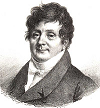

Joseph Fourier was born on March 21, 1768 in the Bourgogne region of France. Fourier originally studied to become a priest, but showed great interest and promised in mathematics. As a young man, he was actively involved in the French revolution. These activities ended his religious ambitions, and even landed Fourier in prison for a while. Fourier served as a scientific and engineering advisor to Napoleon, and was part of the invasion force in Egypt.
Fourier's academic career included positions at Benedictine College, College de France, and finally Ecole Polytechnique. Joseph Fourier died on May 16, 1830 in Paris.
Fourier made fundamental contributions in the theory of heat propagation. Of course, he is now best known for Fourier series and the Fourier transform, two of the most important tools in mathematics. In probability, the Fourier transform appears in the form of the characteristic function of a distribution.